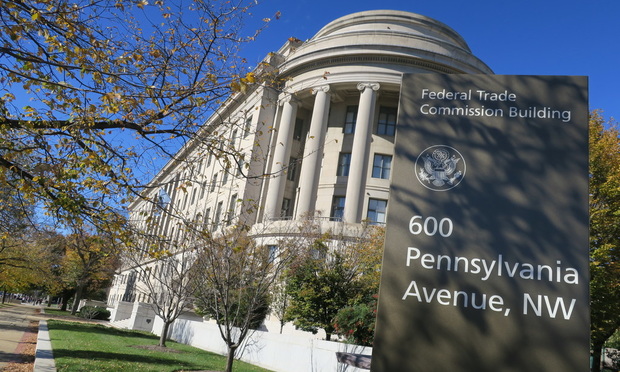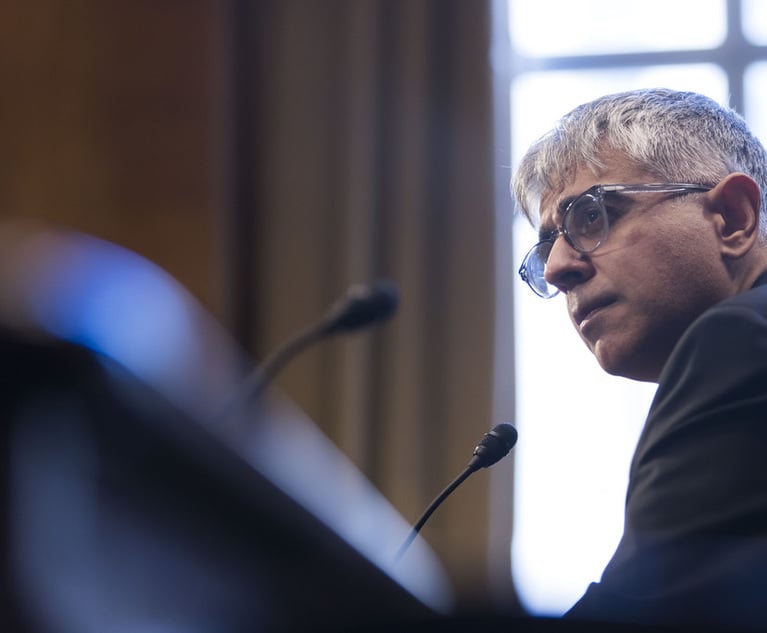Third Circuit Rules FTC Suit Can't Challenge Past Conduct at Shire
A three-judge panel of the appeals court upheld a Delaware district court ruling, which found that the FTC's 2017 suit came too late under Section 13(b) of the Federal Trade Commission Act, which requires the agency to show that a defendant "is violating, or is about to violate," the law with excessive filings meant to improperly suppress generic competition.
February 26, 2019 at 03:42 PM
4 minute read
 Federal Trade Commission. Photo: Michael A. Scarcella/ ALM Media
Federal Trade Commission. Photo: Michael A. Scarcella/ ALM Media
The U.S. Court of Appeals for the Third Circuit on Monday blocked the Federal Trade Commission from reviving a lawsuit accusing a Shire unit years ago of using a web of sham regulatory filings to protect its top-selling gastrointestinal drug.
In a precedential ruling, a three-judge panel of the appeals court upheld a Delaware district court ruling, which found that the FTC's 2017 suit came too late under Section 13(b) of the Federal Trade Commission Act, which requires the agency to show that a defendant “is violating, or is about to violate,” the law with excessive filings meant to improperly suppress generic competition.
The FTC's appeal had asked the court to expand its interpretation of the statutory language to allow a showing that past violations created a “reasonable likelihood” that misconduct would continue in the future.
Though the court declined to directly address the meaning of the statute, Chief Judge D. Brooks Smith wrote that the statute “means what it says,” and held that the FTC was barred from challenging acts that occurred five years before its suit was filed.
“Given the paucity of allegations in the complaint, the FTC fails to state a claim under any reasonable definition of 'about to violate.' Whatever the outer reach of 'about to violate' may be, the facts in this case do not approach it,” Brooks wrote in a 36-page opinion.
The FTC's suit targeted 43 regulatory filings and three federal lawsuits that Shire had filed from 2006 to 2012, after the U.S. Food and Drug Administration changed its standards for assessing bioequivalence.
According to the FTC's complaint, Shire viewed the new rules as a direct threat to sales of Vancocin, then its top revenue-generator, used to treat a certain type of serious gastrointestinal infection. The FTC said Shire's “serial, and meritless” filings lacked any supporting scientific evidence and allowed Shire for years to continue its dominance by delaying FDA approval of generic alternatives to its Vancocin capsules.
The campaign, however, eventually fizzled out, and Shire dropped its product in 2014, two years after generic competition entered the market.
The FTC admitted in court filings that Shire was no longer actively violating the law, but still hinted that it needed an injunction to stop the company from potentially launching a similar petitioning campaign with regard to its hereditary angioedema drug Cinryze.
In his opinion, Smith called those allegations “woefully inadequate” to state a claim against Shire and instead opted to enforce the statute as written.
“Here, the FTC wants to use the most advantageous aspects of each statutory provision—to punish Shire for a past violation using the less onerous enforcement mechanism. But the FTC's attempt to squeeze Shire's conduct into the 'about to violate' category distorts Section 13(b) beyond its intended purpose,” Smith said.
“Section 13(b) cannot accommodate the FTC's interpretation—that 'about to violate' means only that a violation could recur at some future point.”
A spokesman for the FTC did not return a call Tuesday seeking comment on the ruling.
Steven A. Reed, a partner with Morgan, Lewis & Bockius who represented Shire, said the company was “pleased” with the appeals court's ruling but decline to comment any further.
The FTC was represented by agency attorneys Matthew M. Hoffman, Bradley S. Albert, Meredyth Andrus, Thomas J. Dillickrath, June Im, Nicholas Leefer, Joel R. Marcus and Joseph Mathias.
Shire was represented by Reed and Jessica J. Taticchi from Morgan Lewis' Philadelphia office; J. Clayton Everett Jr. and Scott A. Stempel in Washington, D.C., and Noah J. Kaufman from the firm's Boston office.
The case was captioned FTC v. Shire ViroPharma.
This content has been archived. It is available through our partners, LexisNexis® and Bloomberg Law.
To view this content, please continue to their sites.
Not a Lexis Subscriber?
Subscribe Now
Not a Bloomberg Law Subscriber?
Subscribe Now
NOT FOR REPRINT
© 2025 ALM Global, LLC, All Rights Reserved. Request academic re-use from www.copyright.com. All other uses, submit a request to [email protected]. For more information visit Asset & Logo Licensing.
You Might Like
View All
Zoom Faces Intellectual Property Suit Over AI-Based Augmented Video Conferencing
3 minute read
What Went Wrong With Adeel Mangi's Long, Strange Trip Through the Judicial Nomination Process?
6 minute read
Democrats Give Up Circuit Court Picks for Trial Judges in Reported Deal With GOP

Trending Stories
- 1Coral Gables Attorney Busted for Stalking Lawyer
- 2Trump's DOJ Delays Releasing Jan. 6 FBI Agents List Under Consent Order
- 3Securities Report Says That 2024 Settlements Passed a Total of $5.2B
- 4'Intrusive' Parental Supervision Orders Are Illegal, NY Appeals Court Says
- 5Federal Laws Also Preempt State's Swipe Fee Law on Out-of-State Banks, Judge Rules
Who Got The Work
J. Brugh Lower of Gibbons has entered an appearance for industrial equipment supplier Devco Corporation in a pending trademark infringement lawsuit. The suit, accusing the defendant of selling knock-off Graco products, was filed Dec. 18 in New Jersey District Court by Rivkin Radler on behalf of Graco Inc. and Graco Minnesota. The case, assigned to U.S. District Judge Zahid N. Quraishi, is 3:24-cv-11294, Graco Inc. et al v. Devco Corporation.
Who Got The Work
Rebecca Maller-Stein and Kent A. Yalowitz of Arnold & Porter Kaye Scholer have entered their appearances for Hanaco Venture Capital and its executives, Lior Prosor and David Frankel, in a pending securities lawsuit. The action, filed on Dec. 24 in New York Southern District Court by Zell, Aron & Co. on behalf of Goldeneye Advisors, accuses the defendants of negligently and fraudulently managing the plaintiff's $1 million investment. The case, assigned to U.S. District Judge Vernon S. Broderick, is 1:24-cv-09918, Goldeneye Advisors, LLC v. Hanaco Venture Capital, Ltd. et al.
Who Got The Work
Attorneys from A&O Shearman has stepped in as defense counsel for Toronto-Dominion Bank and other defendants in a pending securities class action. The suit, filed Dec. 11 in New York Southern District Court by Bleichmar Fonti & Auld, accuses the defendants of concealing the bank's 'pervasive' deficiencies in regards to its compliance with the Bank Secrecy Act and the quality of its anti-money laundering controls. The case, assigned to U.S. District Judge Arun Subramanian, is 1:24-cv-09445, Gonzalez v. The Toronto-Dominion Bank et al.
Who Got The Work
Crown Castle International, a Pennsylvania company providing shared communications infrastructure, has turned to Luke D. Wolf of Gordon Rees Scully Mansukhani to fend off a pending breach-of-contract lawsuit. The court action, filed Nov. 25 in Michigan Eastern District Court by Hooper Hathaway PC on behalf of The Town Residences LLC, accuses Crown Castle of failing to transfer approximately $30,000 in utility payments from T-Mobile in breach of a roof-top lease and assignment agreement. The case, assigned to U.S. District Judge Susan K. Declercq, is 2:24-cv-13131, The Town Residences LLC v. T-Mobile US, Inc. et al.
Who Got The Work
Wilfred P. Coronato and Daniel M. Schwartz of McCarter & English have stepped in as defense counsel to Electrolux Home Products Inc. in a pending product liability lawsuit. The court action, filed Nov. 26 in New York Eastern District Court by Poulos Lopiccolo PC and Nagel Rice LLP on behalf of David Stern, alleges that the defendant's refrigerators’ drawers and shelving repeatedly break and fall apart within months after purchase. The case, assigned to U.S. District Judge Joan M. Azrack, is 2:24-cv-08204, Stern v. Electrolux Home Products, Inc.
Featured Firms
Law Offices of Gary Martin Hays & Associates, P.C.
(470) 294-1674
Law Offices of Mark E. Salomone
(857) 444-6468
Smith & Hassler
(713) 739-1250






